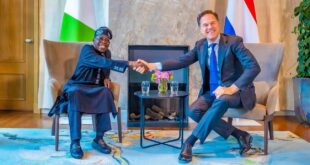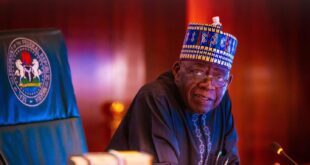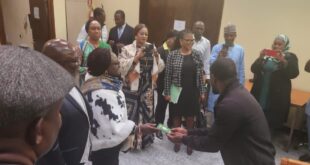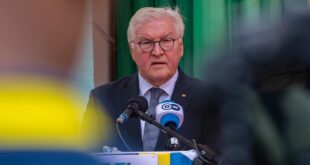Ogoni leaders have called on the Nigerian government to “exonerate” Ken Saro-Wiwa and eight others of all wrongdoing, 25 years after they were executed under controversial circumstances by the Sani Abacha-led military regime and despite the intervention by the international community.
The 9 Nigerian environmental activists were hanged on 10 November 1995 on the orders of the military dictator after they were convicted in a military court of being complicit in the murder of five Ogoni chiefs.
The Ogoni chiefs were ostensibly killed by irate youths for allegedly colluding with the Nigerian government thereby betraying their people. There has been no concrete evidence showing that Saro-Wiwa directly played a role in the murders.
“Since after the execution of Ken Saro-Wiwa and the other Ogoni leaders, there hasn’t been anything that has changed for the Ogoni people. The Ogoni people have continued to suffer, they have not received any kind of justice from the Nigerian government. All we have received in Ogoni is the building of a prison yard, as well as a cemetery,” said Gbenemene Kpae, who heads a committee that planned the 25th memorial in honour of Saro-Wiwa and the other eight Ogoni leaders.
Speaking in a radio interview, “Nigerian state must make an effort for the sake of national peace to exonerate Saro-Wiwa and others,” Kpae added.
“As of today, we have written several letters to the attorney general, we have gotten several assurances. As of today, the Appeal Court also agreed that he was killed wrongly. We are in the Supreme Court, as of today.”
In a tweet on Tuesday, Saro-Wiwa’s daughter, Noo also lamented the fact that her father had not been pardoned, 25 years after his execution.
The deaths of Saro-Wiwa and his co-activists (Saturday Dobee, Nordu Eawo, Daniel Gbooko, Paul Levera, Felix Nuate, Baribor Bera, Barinem Kiobel, and John Kpuine) sparked an international outcry and diplomatic sanctions that effectively turned the Abacha regime to an international outcast.
The writer and poet, tired of seeing the environmental pollution and the ruthless exploitation of natural resources in his native Ogoniland, founded the Movement for the Survival of the Ogoni People (MOSOP) in 1990. He subsequently led an agitation for the clean up of polluted land and waters of the Ogoni, an ethnic group inhabiting a coastal region in southern Nigeria, exposing the devastating impact that Shell Petroleum Development Company’s extraction of fossil fuels from the Niger Delta had on the on the people of the region.
The activities of MOSOP rose the Ogoni from their lethargy. At one protest in 1993, 300,000 Ogonis, about 60 percent of the whole population, came out into the streets.
The Ogoni agitation led to similar protests from other groups in the Niger Delta, many of which took up arms against the Nigerian state and became known as the Niger Delta militias.
An amnesty scheme of the federal government in 2008 led most of the militants to laying down their weapons but the problems of the region persist until today.
Despite the Niger Delta producing most of the country’s oil and gas wealth, the people are desperately poor. The widespread pollution of the land and waters of the region has compounded the hardship of the people as they can no longer farm or fish normally due to the environmental degradation caused by hydrocarbon prospecting and production.
In 2011, the United Nations Environment Program (UNEP) released the first scientific analysis of pollution that confirmed the area which covers nine coastal southern Nigerian states had indeed turned into an ecological disaster.
In 2016, President Muhammadu Buhari launched a US$1 billion oil clean-up exercise in the Niger Delta — promising to reverse the damage and restore the ecosystems.
But observers say very little has been done and the pollution has persisted.
Kola Tella
READ ALSO Ken Saro-Wiwa’s daughter’s take on Nigeria
 THE AFRICAN COURIER. Reporting Africa and its Diaspora! The African Courier is an international magazine published in Germany to report on Africa and the Diaspora African experience. The first issue of the bimonthly magazine appeared on the newsstands on 15 February 1998. The African Courier is a communication forum for European-African political, economic and cultural exchanges, and a voice for Africa in Europe.
THE AFRICAN COURIER. Reporting Africa and its Diaspora! The African Courier is an international magazine published in Germany to report on Africa and the Diaspora African experience. The first issue of the bimonthly magazine appeared on the newsstands on 15 February 1998. The African Courier is a communication forum for European-African political, economic and cultural exchanges, and a voice for Africa in Europe.























